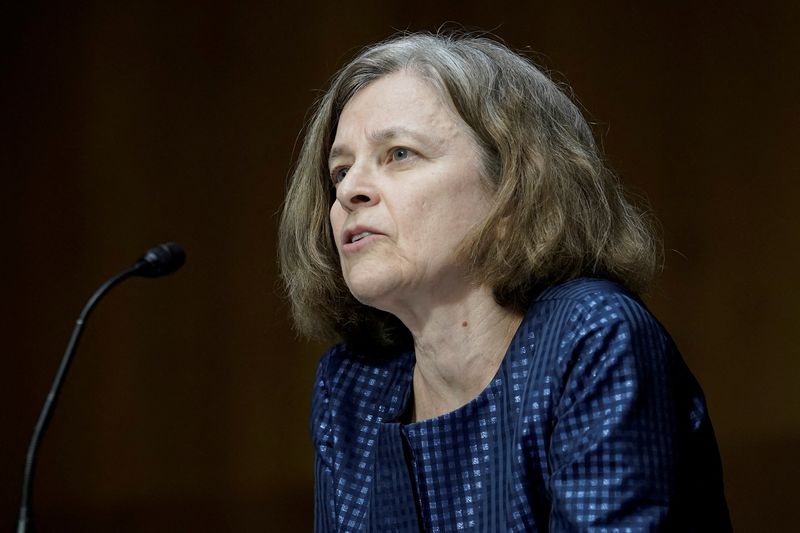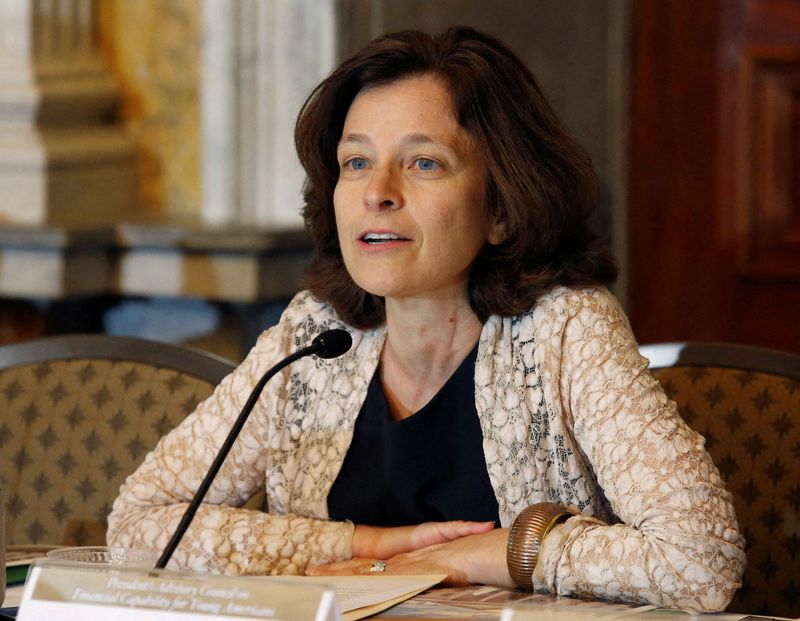By Pete Schroeder and Hannah Lang
WASHINGTON (Reuters) -Sarah Bloom Raskin, President Joe Biden's pick to be the Fed's top bank regulator, told U.S. lawmakers on Thursday that she believes banks need strict oversight, but that it is not her job to tell them how and where to lend.
Raskin was repeatedly challenged by Republicans, who argued that her previous comments suggest that, if confirmed to the role of vice chair for supervision, she would use her post to discourage banks from lending to oil and gas companies in a bid to combat climate change.
Testifying before the Senate Banking Committee, Raskin insisted that is not the Fed's role, but rather it needs to assess the risks banks face from climate change and whether they are properly protected.
"It is banks, bankers who are making the decision about who to lend to. That is not a Fed decision, and it never should be," she said. "It is not a regulatory and supervisory function for a regulator to take over the basic business decision that the bank is making."
Raskin testified alongside Lisa Cook and Philip Jefferson, two of Biden's nominees to become Fed governors.
Raskin, a former Fed governor and senior Treasury Department official during the Obama administration, will take on a sweeping agenda at the Fed if confirmed, where climate change is expected to play a central role.
The Fed is already in the process of building tools to gauge how much risk climate change poses to the financial sector, whether through increasingly frequent severe weather events or the potential devaluing or certain assets as governments and companies shift to less carbon-intensive policies.
Republicans insisted Raskin would use the post to discourage banks from investing in oil and gas companies, pointing to her previous remarks suggesting financial regulators need to be more aggressive on policing climate risk at banks.
"Maybe it’ll be increased capital weightings, maybe it’ll be exposure limits, but the idea will be to allocate capital away from the heavily carbon-emitting parts of our economy," said Senator Pat Toomey, the senior Republican on the panel.
Progressives praised Raskin, citing her lengthy stints of government service, included twice being confirmed for senior roles at the Fed and Treasury. But she will also need to ensure the support of moderate Democrats in order to be confirmed by the narrowly divided Senate.
Senator Sherrod Brown, the committee chairman, previously said he would like the committee to advance the trio, along with the renomination of Fed Chair Jerome Powell and the elevation of Fed Governor Lael Brainard to the U.S. central bank's vice chair position, on Feb. 15.
On Thursday, there was little sign of moderate discomfort with Raskin's nomination. Senator Mark Warner, a moderate Democrat from Virginia, noted he had heard from bankers who had good relationships with her. And Senator Jon Tester from Montana expressed support for the Fed learning more about climate change, noting its impact on agricultural production.
"It is rather obvious climate change has to be part of the information you have to gather," he said.
In her testimony, Raskin vowed to be an attentive, comprehensive bank watchdog, tracking everything from internal bank risks to cyberattacks.

Raskin said cybersecurity was the top concern she hears from bankers, who have spent large amounts to bolster their safeguards.
"You would be really amazed to learn how much money banks have spent actually trying to defend themselves against these cyber attacks," she said. "It’s not the role of the Fed certainly to stop cyberattacks, but I do think it’s important from a supervisory and risk perspective to make sure that the financial sector feels that it has the defenses."
